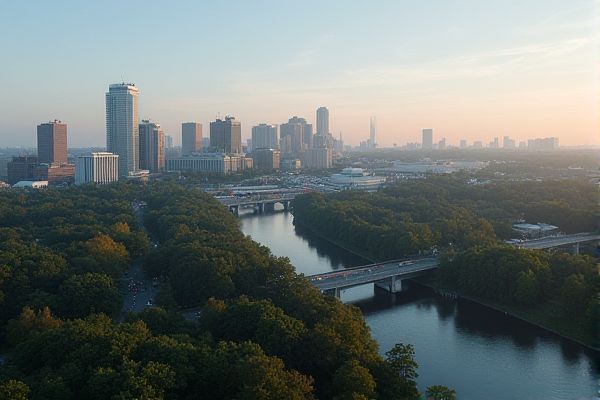
Local laws and regulations in South Carolina: Open container law. Boating under the influence (BUI). Fireworks restrictions. Noise ordinances. Homeowner association rules. Building permits. Vehicle tint regulations. Smoking bans. Hunting seasons. Short-term rental laws.
Open container law
In South Carolina, state law prohibits driving with an open container of alcohol in the driver's and passenger areas of a vehicle, with exceptions for transport in the trunk or luggage compartment. Local municipalities, such as Charleston, have additional ordinances that make it a crime to possess or consume open containers in public places, including streets and sidewalks, unless a special event permit is issued. For more detailed information about these regulations, you can visit the Open Container Laws in South Carolina page. Understanding these laws is crucial for individuals who wish to avoid legal issues and maintain compliance with both state and local regulations.
Boating under the influence (BUI)
In South Carolina, Boating Under the Influence (BUI) is a serious offense that can result in significant legal consequences. Depending on the severity and circumstances, BUI can be classified as either a misdemeanor or a felony. Initial infractions may attract fines and brief incarceration, while more severe penalties are imposed for repeated offenses or incidents where injury occurs. The penalties can range substantially, with fines reaching up to $6,000 and imprisonment for up to 3 years for misdemeanor charges. In cases classified as felonies, the penalties can be as steep as $25,000 in fines and 25 years in prison. For detailed information on the penalties for boating under the influence, you can visit the Boat Ed website to fully understand the implications of these offenses.
Fireworks restrictions
In South Carolina, fireworks are allowed on private property between 7:00 a.m. and 10:00 p.m., with exceptions extending until 12:30 a.m. on July 5 and New Year's Day. However, they are strictly prohibited on beaches and public property. Violations of these regulations can lead to fines of $250 for the first offense and $500 for subsequent offenses. Additionally, there are specific restrictions to prevent directing fireworks towards people, animals, or structures. For more detailed information, visit the City of Myrtle Beach website.
Noise ordinances
In South Carolina, noise ordinances vary by locality but generally prohibit unreasonably loud, excessive, and disturbing noises. Specific regulations include restrictions on vehicle horns, loud music and sound equipment, construction noise, and other noise-producing activities, especially during late hours or near residential, educational, or healthcare facilities. To explore detailed regulations in West Columbia, you can visit their Code Library, which provides comprehensive information about local laws governing noise and other community standards.
Homeowner association rules
In South Carolina, Homeowners Associations (HOAs) are not governed by specific government regulations but must comply with the Nonprofit Corporation Act and disclose regulations to homeowners before property purchase. HOAs have the power to create and enforce their own rules, collect assessments, and maintain records, with homeowners having voting rights and access to financial statements and meeting notices. For more detailed information, you can explore the comprehensive guide on South Carolina HOA Laws and Regulations, which delves into the intricacies of these associations.
Building permits
In South Carolina, building permits are essential for constructing, enlarging, altering, repairing, moving, demolishing, or changing the occupancy of a building or structure, or for installing, altering, or replacing electrical, gas, mechanical, or plumbing systems. The application process involves submitting a completed permit application, notarized authorization, detailed plans, and other specific documents, with varying requirements for residential and commercial projects. For more detailed information, visit the Horry County Code Enforcement page.
Vehicle tint regulations
In South Carolina, vehicle window tint regulations require a minimum of 27% visible light transmission (VLT) for all side and rear windows, ensuring that the tint is non-reflective and free from red, yellow, or amber hues. The front windshield can feature a tinted strip up to the AS-1 line, while vehicles sporting tinted rear windows are mandated to have dual side mirrors. To learn more about the specifics of these regulations, you can visit the detailed guide on Window Tint Laws in South Carolina.
Smoking bans
In South Carolina, smoking is prohibited in various public indoor and outdoor areas, including Public Schools, Childcare Facilities, Health Care Facilities, Government Buildings, Elevators, and within 20 feet of outdoor public events and transportation stations. More details about these regulations can be found on the South Carolina Statehouse website. Violations of these prohibitions are punishable by a fine of $10 to $25.
Hunting seasons
South Carolina's hunting seasons are divided into four distinct zones, each with specific dates for deer, bear, turkey, and small game hunts. Seasons and regulations vary by zone and type of game; additional permits and tags are often required to ensure compliance. Hunting is subject to rules such as legal hunting times and prohibited methods, making it essential for hunters to stay informed. For more detailed information on these regulations, seasons, and necessary permits, you can visit the Berkeley Outdoors website, where all relevant details are thoroughly outlined. By adhering to these guidelines, hunters can responsibly enjoy the rich hunting opportunities throughout the state.
Short-term rental laws
In South Carolina, short-term rental laws vary by location, requiring hosts to obtain local permits, business licenses, and comply with specific regulations such as proving primary residence, adhering to zoning inspections, and meeting safety and tax requirements. Cities like Charleston, Beaufort, and Columbia have unique stipulations. For more detailed information, you can visit Steadily's website to learn about these regulations and how they might impact rental operations. Navigating these laws ensures that hosts operate within legal guidelines while contributing positively to their communities.
